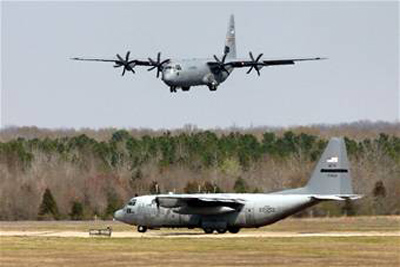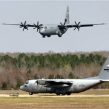
KYRGYZSTAN ASKS FOR MANIFOLD INCREASE IN U.S. PAYMENTS FOR MANAS
Publication: Eurasia Daily Monitor Volume: 3 Issue: 18
By:

On January 25, Kyrgyz officials announced that the Ministry of Foreign Affairs had handed over to the U.S. Embassy in Bishkek a note demanding major revisions to the agreement on the use of Manas air base. Formally, the initiative stems from Kyrgyzstan’s parliament and government. However, the Kremlin is undoubtedly no stranger to Bishkek’s move.
The note asks for a manifold increase in U.S. rental payments for using the base, plus compensation for purported ecological damage, and also includes unspecified new provisions “in line with Kyrgyzstan’s national interests.” The Kyrgyz side proposes to hold a meeting at the level of experts in Bishkek with the U.S. side to discuss the new conditions (Interfax, January 25).
President Kurmanbek Bakiyev started this ball rolling in December 2005 by publicly demanding $200 million per year from the United States for using the Manas base. Apparently this sum was to cover rent and services; whether it was also meant to cover aviation fuel was not clear. Bakiyev termed this amount “tens of times higher” than that stipulated by the existing agreement. He resorted to a variety of justifications: the U.S. payments since 2002 had been merely “symbolic”; the rent must rise to the extent he indicated in order to reflect “market prices”; and it also “must take the Kyrgyz people’s social situation into account.” Thus, philanthropy as well as the “market” seemed to justify squeezing the United States. Bakiyev, moreover, ruled out bargaining; “this is not a bazaar,” he advised (Interfax, December 15). It seems hardly likely that the Kyrgyz president would challenge the United States to this extent without the Kremlin’s encouragement, if not its initiative.
Kyrgyz officials also seek some “compensation” from the United States for payments Washington made to two private firms connected with former president Askar Akayev’s family. The officials reproach the United States for not having paid into the Kyrgyz state budget. However, those private firms held the contracts to supply fuel and services to the Manas base. The Pentagon points out that it has paid fair rental value for using the base and that the allegations of corruption regarding the former president’s circle are an internal Kyrgyz matter for which the United States can not be held legally or financially liable.
On January 17, Parliament Chairman Omurbek Tekebayev announced that he is overseeing the drafting of legislation to regulate the use of the Manas base. This draft legislation would nationalize the land on which the base is located and would apparently require the United States to pay $50 million annually in rent alone, henceforth to the state. The land, approximately 1,000 hectares in all, has been owned or controlled by several different entities that charge different rental fees for use of their respective land portions by the United States. Moreover, state firms henceforth would provide services to the base and the payments would go into the state budget.
The draft legislation and the diplomatic note mark a new phase in a process that began with the Moscow-instigated resolution of the Shanghai Cooperation Organization (SCO) summit on July 5, 2005, calling for dates to be set for closure of U.S.-led bases in Central Asia. That resolution in and of itself did not foreordain much, as the basing arrangements were bilateral matters between the United States and each host country. Uzbekistan was willing to negotiate for continued use of the K-2 base by the United States, and Kyrgyz officials wavered, although Bakiyev himself hastened to endorse SCO’s call unconditionally and with a televised bow to “Vladimir Vladimirovich” Putin for initiating that demand. In the event, U.S. Defense Secretary Donald Rumsfeld’s visit to Bishkek succeeded in ensuring the continuation of full U.S. access to Manas, while political Washington overruled the Pentagon regarding Uzbekistan and lost several opportunities to retain U.S. access to K-2 (see EDM, July 29, September 22, 29, November 17).
The net result is narrower U.S. options with heavier reliance on Manas and, thus, stronger bargaining leverage for Moscow and Bishkek regarding this base. Moscow will not want to pressure the United States in Kyrgyzstan too soon after the eviction from Uzbekistan, certainly not without a “decent interval” to mitigate Washington’s possible reaction. While the Kremlin may be pondering follow-up steps, Bishkek will seek to maximize its financial gain from the U.S. presence.
(Interfax, January 17, 24, 25; Akipress, January 18, 24)




